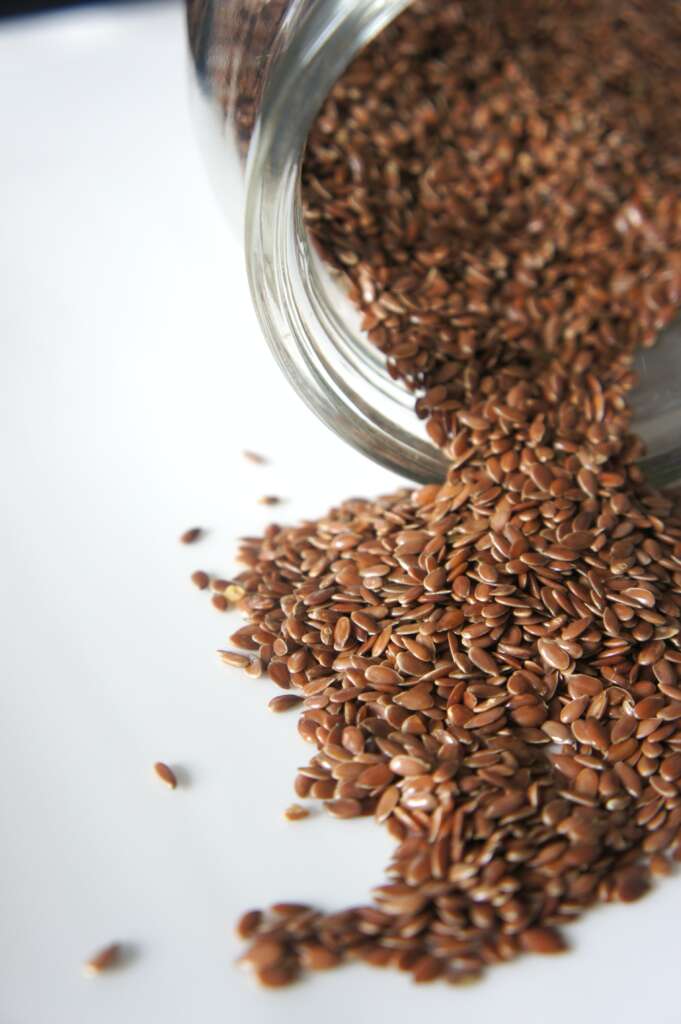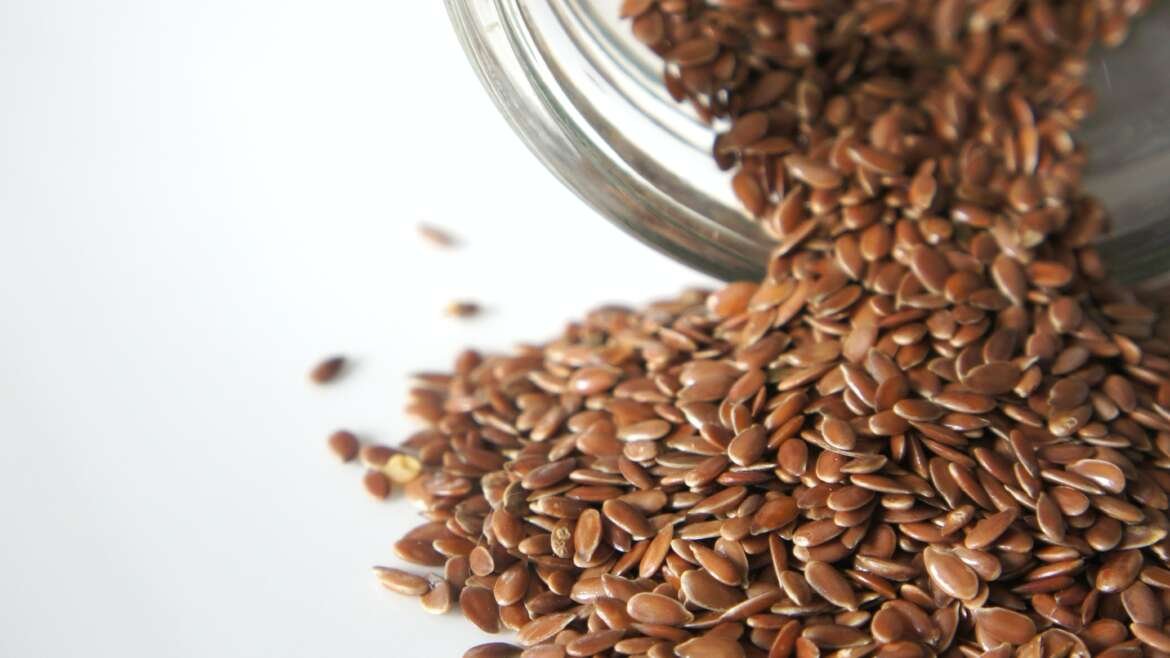

Flaxseed is a plant-based food that contains omega-3 fatty acids, antioxidants, and fibre. Some people refer to it as a “functional food,” which means that it can be consumed to improve one’s health. Flax was grown as a crop in ancient Egypt and China. For thousands of years, it has played a role in Ayurvedic medicine in Asia.
Flaxseed is now available in seeds, oils, powder, tablets, capsules, and flour. It is used as a dietary supplement to treat constipation, diabetes, high cholesterol, heart disease, cancer, and a variety of other ailments. Flaxseed contains lignans, antioxidants, fibre, protein, and polyunsaturated fatty acids such as alpha-linolenic acid (ALA), or omega-3. Consuming these nutrients may help reduce the risk of developing certain diseases.
However, there isn’t enough evidence to back up all of these claims right now. Discover what the research says about flaxseed and its potential health benefits.
Potential health advantages:
Flaxseed’s omega-3 fatty acid content may aid in the prevention of certain types of cancer cell development. Flaxseed contains nutrients that may provide health benefits.
Flaxseed, like other plant-based foods, is high in antioxidants.
These can help prevent disease by removing molecules in the body known as free radicals. Natural processes and environmental pressures produce free radicals. Excess free radicals in the body can cause oxidative stress, which can lead to cell damage and disease. Antioxidants aid in the removal of free radicals from the body.
Flaxseed contains lignans, which appear to have antioxidant properties. According to some scientists, flaxseed contains more lignans than most other foods.
The sections that follow go into greater detail about the potential health benefits of flaxseed. lowering the cancer risk Flaxseed is high in omega-3 fatty acids.
According to research, these may help prevent the growth of various types of cancer cells. Flaxseed also contains lignans, which are antioxidants that may slow tumour growth by preventing new blood vessels from forming. According to one 2013 study, females who consumed flaxseed on a regular basis had a lower incidence of breast cancer.
In addition, the authors of a review published in 2018 concluded that flaxseed may help reduce the risk of breast cancer after menopause. Lignans are a type of phytoestrogen, which is a plant-based nutrient that has estrogen-like properties. There has been some concern that phytoestrogens may increase the risk of breast cancer, but new research suggests that they may actually protect against it.
What role does diet play in cancer risk?
Improve your cholesterol and heart health by reading this. American Heart Association (AHA) The American Heart Association (AHA) recommends eating more fibre and omega-3 fatty acids to improve heart health. Lignans may also aid in the prevention of cardiovascular disease. All of these nutrients are found in flaxseed.
Flaxseed contains phytosterols as well. Phytosterols have a similar structure to cholesterol, but they help to prevent cholesterol absorption in the intestines. Consuming phytosterols may thus aid in the reduction of low-density lipoprotein (LDL), or “bad,” cholesterol levels in the body. In 2010, researchersTrusted Source investigated the effect of flaxseed on the cholesterol levels of moderately high cholesterol males. For 12 weeks, participants took either a 20 milligramme (mg) lignan capsule, a 100 mg capsule, or a placebo. Lignans reduced cholesterol levels, especially in those who took the 100 mg capsules. The authors of a 2012 study, involving 17 people discovered that eating flaxseed lowered LDL cholesterol levels and helped the body remove fat, though they caution that the overall diet may also play a role. The researchers hypothesised that dietary flaxseed could help lower cholesterol levels. Some researchers have also linked omega-3 oils, which are commonly found in oily fish, to lower cardiovascular risk. According to researchersTrusted Source, flaxseed may offer an alternative to marine sources of omega
3. This could make it a valuable resource for those who eat a plant-based diet.
Find out more about soluble and insoluble fibre:
https://saddlebrown-seahorse-891800.hostingersite.com/soluble-and-insoluble-fibre/
Relieving arthritis symptoms Flaxseed, according to the Arthritis Foundation, may help reduce joint pain and stiffness. It is used to treat rheumatoid arthritis, lupus, and Raynaud’s phenomenon in some people. They add that there isn’t enough evidence to back up its use for this purpose, but the ALA in flaxseed may help reduce inflammation. It can be taken as ground (one tablespoon per day), oil (one to three tablespoons per day), or capsules (1,300–3,000 mg per day)
What exactly is an anti-inflammatory diet? Find out more here.
Getting rid of hot flashes In 2007, a group of researchers published findings indicating that flaxseed may help reduce the frequency or severity of hot flashes in women who do not use oestrogen therapy during menopause.
However, further research by the same team in 2012 concluded that flaxseed made no difference. Improving blood sugar levels Lignans and other phytoestrogens may help reduce the risk of chronic diseases like diabetes.
For 12 weeks in 2013, scientists gave 25 people 0 g, 13 g, or 26 g of flaxseed every day. The participants had prediabetes and were either obese or overweight males or menopausal females. The 13 g dosage appeared to lower glucose and insulin levels and improve insulin sensitivity, whereas the other dosages did not.
In addition, a 2016 rodent study found that flaxseed compounds may help reduce the incidence of type 1 diabetes and delay the onset of type 2 diabetes. However, these findings may not be applicable to humans.
For 12 weeks, 99 people with prediabetes were given 40 g or 20 g of flaxseed or no flaxseed and no placebo. Consuming flaxseed appeared to lower blood pressure, but it had no effect on blood sugar levels or insulin resistance. The effects of flaxseed on diabetes symptoms are unknown.
Which foods can help lower blood sugar levels?
https://saddlebrown-seahorse-891800.hostingersite.com/what-is-pre-diabetes-and-how-to-reverse-it/
Constipation prevention
Flaxseed contains insoluble fibre, which does not dissolve in water and thus remains in the digestive tract after eating. It absorbs water and adds bulk, which may aid in the promotion of regularity. However, according to the National Center for Complementary and Integrative Health(NCCIH), there is little evidence that flaxseed helps with constipation.
According to the NCCIH, consuming flaxseed with too little water can worsen constipation and lead to intestinal blockage. In addition, eating too much flaxseed or flaxseed oil can cause diarrhoea.
What foods can help with constipation? Find out more here. Radiation impact reduction In 2013, scientists discovered evidence that dietary lignans from flaxseed helped mice recover from radiation exposure. In comparison to mice that did not consume lignans, those that did had lower levels of inflammation, injury, oxidative damage, and fibrosis, as well as a higher survival rate.
Nutrition
A tablespoon of ground flaxseed weighing 7 g, according to the United States Department of Agriculture, contains:
• energy: 37.4 calories
• 1.28 g protein;
2.95 g fat;
2.02 g carbohydrate;
1.91 g fibre;
17.8 mg calcium;
27.4 mg magnesium
• 44.9 mg phosphorus;
56.9 mg potassium;
6.09 micrograms (mcg) folate;
45.6 mcg lutein and zeaxanthin
A teaspoon of flaxseed contains trace amounts of vitamins and minerals, but not in significant amounts. It also contains lignans, tryptophan, lysine, tyrosine, and valine, as well as unsaturated fats that are good for you. People should avoid eating whole flaxseed and instead eat ground flaxseed because the nutrients in whole flaxseeds may not be absorbed by the intestines. Chia seeds could be another nutritious addition to your diet. Find out more about them here.
Risks
Flaxseed’s nutrients may not be beneficial to everyone. If you are taking blood thinners such as warfarin (Coumadin) or aspirin, you should avoid flaxseed products or consult your doctor first. • use nonsteroidal anti-inflammatory drugs (NSAIDs)
• take cholesterol-lowering medications
• have hormone-sensitive breast or uterine cancer
• are pregnant or breastfeeding
• are allergic to flaxseed, according to a reliable source
People who consume flaxseed should avoid raw and unripe flaxseeds, as they may contain toxic compounds.
To avoid digestive issues, consume flaxseed ground and with plenty of fluid.
Because flaxseed oil spoils quickly, buy only small bottles in dark bottles and keep them in the refrigerator. Also, do not use the oil after the expiration date on the label.
Cooking with flaxseed oil should be avoided. Avoid microwaving to reheat dishes that have already been prepared with the oil.
Dietary advice
Flaxseed can be consumed ground, as an oil, or in capsule form. It’s also in ready-to-eat foods like muffins and other baked goods, pastas, snack bars, and milk alternatives.
Ground flaxseed can be added to:
• breakfast cereals
• smoothies
• soups and stews
• salads and sandwiches
People can also substitute flaxseeds for breadcrumbs when making muffins or coating chicken. Using too much flaxseed, on the other hand, can give food a bitter taste that some people dislike. One solution is to begin with small amounts and gradually increase them to taste. Flaxseed and flaxseed products are high in antioxidants, particularly lignans. T
hey may have some health benefits, but there isn’t enough evidence to back this up right now. Anyone considering using flaxseed should consult with a doctor first to ensure that it is safe for them to do so.


Add Comment